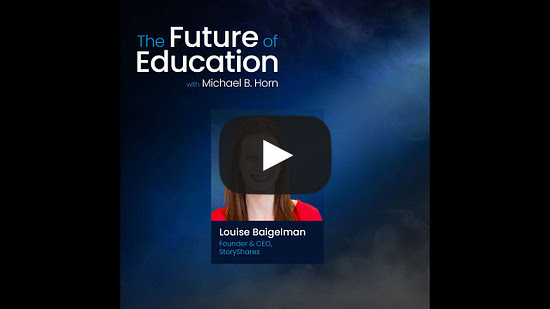October 13, 2023
Tackling the Adolescent Literacy Crisis: Why Elementary School Content Doesn’t Make the Grade
An item from a neo-liberal… This one is an item from a business professor with little direct experience in education, but who believes free market economic principles are the answer to education’s (and pretty much all other society’s social) problems.
Open in app or online
OCT 11 Tackling the Adolescent Literacy Crisis: Why Elementary School Content Doesn’t Make the Grade
MICHAEL B. HORN On the latest Future of Education, Louise Baigelman, the founder of startup Story Shares, joined me to discuss the reading crisis that affects not only elementary-school students, but also adolescents. For adolescent students, although they need to learn the same skill sets as elementary-school students to become strong readers, how they build those skills needs to be different. Baigelman shared her insights from teaching middle school English language learners and working with students with learning disabilities. In particular, she spoke to the challenges she had in finding appropriate books—from a content perspective—for these students. The dearth of materials these learners found engaging—while still being rigorous to the skills they needed to build—is what caused her to found Story Shares.
A few choice quotes that Louise offered from our conversation that I found revealing:
We’ve actually combined these decodable texts as chapters into a chapter book so that they feel like a YA novel, but each chapter is on a discrete sound or skill that they’re practicing.
and
Ninety-two percent of educators said they currently can’t find good books to offer their students to practice if they’re struggling with reading.
As always, subscribers can listen to the conversation, watch it on YouTube, or read the transcript.
There’s a real reading crisis, not just across the country, but across the world, where lots of individuals, they’ve progressed past third grade, where you’re supposed to theoretically have learned to read and just have not developed the foundational skills to do so. To help us talk about this and to present some solutions to these problems is Louise Baigelman. She’s the founder of the startup Story Shares. And Louise, first, it’s great to see you, but I’m so excited to talk to you because of what you’re building to really tackle what is an immense problem.
Louise Baigelman:
Yeah, thank you so much. I’m really excited to be here and chat with you about it. Thank you for having me.
Morning Warmup
Michael Horn:
Yeah, absolutely. So let’s launch into our morning warm up. Why don’t you give folks just a sense of how you come into this question of literacy, your own background, working in education before you founded Story Shares.
Louise Baigelman:
Yeah, so I’m a reader and a writer by nature, and I was an English major. I went to Teach for America right from college, and I taught middle school English language learners in Lynn, north of Boston. And that was where the initial seed for Story Shares came from as far as working with students who were mature but struggling with reading and having challenges, which I’ll talk more about, with finding the right books for them. And I then worked at a family foundation that was interested in that same challenge, but from a learning disabilities perspective, older students who may have dyslexia or another reason for struggling with reading and need help from there. So that was where the Story Shares came from initially.
Michael Horn:
Perfect. No, you had this rich background in education and describe the problem that you saw. I mean, I sort of alluded to it in the intro, but really dimensionalize what you saw on the ground when you were working with adolescent youth.
Louise Baigelman:
Yeah, so it was striking to me, and it still is, reading is often taught in elementary school. That’s how it was created. But my students were in middle school, and they were beginning readers. So they had just moved from Haiti or the Dominican Republic, and they were 12- 13- years old in middle school, but they were reading at a 1st, 2nd, 3rd grade level. And at that point, the books that I could find to offer them to read that were on their reading level were books written for 1st, 2nd, 3rd graders. And so those were books Junie B. Jones, even Hop on Pop if you’re working on the very basic levels. And my students wanted nothing to do with those stories.
They were really aware of themselves and their peers and what everyone else was reading. They didn’t want to have to read baby books, but the books that their peers were reading were just far above their level and way too difficult for them to access. And I was noticing the impact of their low literacy across the board. I was supporting these students in English, but also in becoming a middle school student in America and being able to succeed in science and math and social studies. And without them being able to read, they were falling behind in all of those subjects. They couldn’t read the directions, but I couldn’t find books to offer them while we were practicing at these skills. And so for me, without good books that they could read and want to read, it would just compound. They wouldn’t read.
They’d rather pretend to read a difficult book than actually read. And so their skills, they stagnated at that point. And then the ripples from there across the subjects and more broadly were dramatic. So I just wondered, isn’t there a way to create a book that we could offer these students that’s engaging to them, that’s relevant? It’s written for their age level, features, characters that look like them, more representative and inclusive, but was just more simply told, written in a more basic way so that they could scaffold up as they improved their skills.
© 2023 Michael Horn
No comments yet.
RSS feed for comments on this post. TrackBack URI
- SEO Powered Content & PR Distribution. Get Amplified Today.
- PlatoData.Network Vertical Generative Ai. Empower Yourself. Access Here.
- PlatoAiStream. Web3 Intelligence. Knowledge Amplified. Access Here.
- PlatoESG. Carbon, CleanTech, Energy, Environment, Solar, Waste Management. Access Here.
- PlatoHealth. Biotech and Clinical Trials Intelligence. Access Here.
- Source: https://virtualschooling.wordpress.com/2023/10/13/tackling-the-adolescent-literacy-crisis-why-elementary-school-content-doesnt-make-the-grade/
- :is
- :not
- :where
- $UP
- 11
- 13
- 16
- 160
- 1st
- 2023
- 24
- 33
- 3rd
- 40
- 8
- a
- Able
- About
- about IT
- above
- absolutely
- access
- across
- actually
- age
- All
- also
- Although
- always
- america
- an
- and
- Another
- answer
- appropriate
- ARE
- AS
- At
- auto
- aware
- b
- Baby
- background
- basic
- BE
- because
- become
- becoming
- before
- begin
- Beginning
- behind
- being
- believes
- board
- book
- Books
- boston
- broadly
- build
- Building
- business
- but
- by
- came
- CAN
- Category
- caused
- Center
- challenge
- challenges
- Chapter
- chapters
- characters
- choice
- College
- combined
- come
- comment
- comments
- Compound
- content
- Conversation
- could
- country
- create
- created
- crisis
- Currently
- data
- describe
- developed
- different
- difficult
- direct
- directions
- disabilities
- discuss
- do
- Doesn’t
- Dont
- dramatic
- each
- Economic
- Education
- educators
- else
- end
- engaging
- English
- Ether (ETH)
- Even
- everyone
- excited
- experience
- Falling
- family
- far
- Features
- feedback
- feel
- few
- Find
- finding
- First
- For
- found
- Foundation
- Founded
- founder
- Free
- from
- future
- Give
- good
- grade
- great
- Ground
- had
- Have
- having
- help
- her
- here
- How
- HTTPS
- i
- I’LL
- identifier
- if
- immense
- Impact
- improved
- in
- Inclusive
- individuals
- initial
- initially
- insights
- interested
- into
- IT
- joined
- jones
- just
- language
- latest
- launch
- LEARN
- learned
- learning
- Level
- levels
- like
- literacy
- little
- Look
- look like
- lots
- Low
- major
- make
- Market
- materials
- math
- mature
- May..
- me
- mean
- Meta
- Michael
- Middle
- more
- morning
- moved
- much
- my
- Nature
- Need
- needed
- needs
- no
- North
- nothing
- novel
- of
- offer
- offered
- often
- Old
- older
- on
- ONE
- only
- or
- Other
- our
- own
- particular
- past
- peers
- percent
- perspective
- plato
- Plato Data Intelligence
- PlatoData
- pm
- Point
- pop
- Post
- practice
- present
- presentation
- pretty
- principles
- Problem
- problems
- Professor
- progressed
- question
- quotes
- rather
- Read
- Reader
- readers
- Reading
- real
- really
- reason
- reduce
- relevant
- representative
- Republic
- resource
- revealing
- Rich
- right
- rigorous
- ripples
- Said
- same
- saw
- School
- Science
- see
- seed
- sense
- Sets
- shared
- Shares
- she
- Simple
- simply
- site
- skill
- skills
- So
- Social
- Solutions
- some
- Sound
- spam
- startup
- Still
- Stories
- Story
- strong
- Struggling
- Student
- Students
- studies
- subscribers
- succeed
- Supporting
- supposed
- syndication
- tackle
- tackling
- TAG
- Talk
- taught
- Teaching
- than
- thank
- that
- The
- the world
- their
- Them
- themselves
- then
- There.
- These
- they
- Third
- this
- those
- to
- told
- too
- Transcript
- under
- us
- uses
- very
- want
- wanted
- warm
- was
- Watch
- Way..
- we
- went
- were
- What
- What is
- when
- which
- while
- WHO
- why
- with
- without
- WordPress
- worked
- working
- world
- would
- writer
- written
- years
- yet
- you
- Your
- youth
- youtube
- zephyrnet













